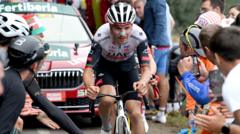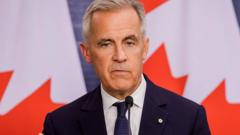Did Almeida Claim His First Vuelta Stage Win Amid Protests?

Published: 2025-09-05 17:24:09 | Category: sport
Joao Almeida clinched his first individual stage victory at the Vuelta a España, triumphing in the challenging 13th stage atop the Alto de Angliru. In a display of endurance and strategy, he outpaced overall leader Jonas Vingegaard, bringing the competition for the general classification even closer. The stage was marred by protests, highlighting the ongoing geopolitical tensions affecting the race environment.
Last updated: 16 October 2023 (BST)
Key Takeaways from Stage 13
- Joao Almeida secured his first stage win, closing the gap to Vingegaard in the general classification.
- The stage was interrupted by pro-Palestinian protests, impacting some riders.
- Almeida's victory came at a steep climb, demonstrating his climbing prowess.
- Tom Pidcock remains in the overall top three despite finishing seventh.
- The protests have sparked discussions about team participation amid political tensions.
The Dramatic Climb at Angliru
The 13th stage of the Vuelta a España, stretching 202.7 km from Cabezon de la Sal to the Alto de Angliru, is infamous for its steep gradients and punishing terrain. As riders approached the final climb, Almeida made his move, overtaking team-mate Felix Grossschartner and establishing a lead over Vingegaard. The steepness of Angliru, often regarded as one of the hardest climbs in professional cycling, has a gradient that can reach up to 24%, testing the limits of even the strongest competitors.
Almeida's Strategy and Performance
Almeida's victory was not just a testament to his physical capabilities but also to his strategic acumen. "I just put my pace from the bottom and I just did my bit the best I could," he remarked after the race. His ability to maintain composure while being closely followed by Vingegaard was crucial. With this win, Almeida not only earned bonus seconds but also narrowed the overall time gap to the leader to 46 seconds, intensifying the battle for the overall title.
Impact of Protests on the Race
This stage was not without its controversies. Pro-Palestinian protests disrupted the race, impacting riders like Jefferson Cepeda and Bob Jungels, who were initially leading before the demonstration. The protests, which lasted a few seconds, drew attention to the broader political issues impacting the region and the athletes involved. Despite the interruptions, Vinokurov, one of the affected riders, stated that the demonstration did not significantly alter the race's outcome, as "we knew we would be caught by the best."
Political Tensions and Team Responses
The protests have led to calls from local authorities, including Gimena Llamedo, vice-president of Asturias, for Israel-Premier Tech to withdraw from the race. This request stems from the ongoing conflict in Gaza and the humanitarian concerns arising from it. Llamedo stated, "Not even the government of Spain has it. But what we can and want to do is express our disagreement." Despite this, Israel-Premier Tech has firmly ruled out withdrawing from the event, emphasizing the importance of not setting a precedent that could impact cycling as a sport.
Overall Standings and Future Stages
Following the 13th stage, the overall standings are tightening. Vingegaard leads with a total time of 49 hours, 30 minutes, and 54 seconds, with Almeida in second and Tom Pidcock in third at 2 minutes and 18 seconds behind. With two additional stages in Asturias, the competition remains fierce as riders prepare for potential shifts in the rankings.
What Does This Mean for the Vuelta a España?
The events of stage 13 underscore the complex interplay between sport and politics, particularly in a high-stakes environment like the Vuelta a España. As riders navigate not only the challenging terrain but also the social and political climate, the outcomes of the remaining stages will be critical. Almeida's victory represents a significant moment in his career and adds an exciting dimension to the ongoing race. The protests also serve as a reminder of the broader issues affecting athletes and spectators alike.
Conclusion: Looking Ahead
The Vuelta a España continues to captivate cycling fans worldwide, with each stage presenting new challenges and opportunities for the riders. As Almeida and Vingegaard vie for the top position, the implications of the ongoing protests will undoubtedly influence future events. What will happen next in this gripping competition? With the dramatic backdrop of political tensions, the outcome remains uncertain but undeniably compelling.
FAQs
Who won stage 13 of the Vuelta a España?
Joao Almeida won stage 13, marking his first individual stage victory in the Vuelta a España.
What was the impact of protests during the race?
Pro-Palestinian protests disrupted the race, affecting several leading riders but did not significantly change the overall race outcome.
How did Almeida's victory affect the overall standings?
Almeida's win reduced his time gap to overall leader Jonas Vingegaard to 46 seconds, intensifying the competition for the title.
What are the remaining stages of the Vuelta a España?
There are two more stages in Asturias, where the competition is expected to remain fierce as the riders push towards the finish line.
What is the significance of the Alto de Angliru climb?
The Alto de Angliru is known for its extreme steepness and is considered one of the toughest climbs in professional cycling.
#VueltaAEspaña #JoaoAlmeida #CyclingNews



